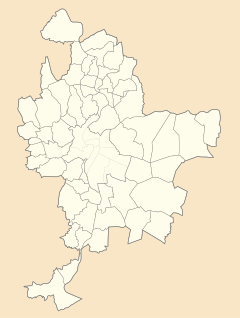The Musée d'art contemporain de Lyon (French pronunciation: [myze daʁ kɔ̃tɑ̃pɔʁɛ̃ də ljɔ̃]) is a museum devoted to contemporary art, located in the 6th arrondissement of Lyon, in the Cité Internationale, next to the cinema, in front of the Parc de la Tête d'Or. It had over 42,000 visitors in 2007.
| Musée d'art contemporain de Lyon | |
|---|---|
 Facade of the museum | |
| General information | |
| Type | Museum |
| Architectural style | 1930s / modern |
| Location | 81, quai Charles de Gaules, 6th arrondissement of Lyon, Lyon, France |
| Coordinates | 45°47′03″N 4°51′09″E / 45.78417°N 4.85250°E |
| Construction started | 1984 (in the Musée des Beaux-Arts) 1995 (Cité Internationale) |
| Inaugurated | 1995 |
| Design and construction | |
| Architect(s) | Renzo Piano |
History
editThe decision to create the museum occurred in 1983, and was organized in 1984, but at the time it was housed in the Museum of Fine Arts of Lyon and was named Musée Saint-Pierre art contemporain. In 1988, it officially received the status of contemporary art museum granted by the Direction des Musées de France.[1] In 1995, it moved to the 6th arrondissement in a building designed by Renzo Piano. It was inaugurated on 19 December of the same year, and welcomed nearly 130,000 visitors during the two months of the 3rd Biennial of Lyon.[2]
The building has both a 1930s, facade and a modern brick volume. It has two side entrances and a 2700 sq.m. area. It has organized over a hundred exhibitions.[2]
The museum's philosophy is to present works created by artists directly on the site. The permanent collection, which is the largest European group installations ever assembled in a museum, alternates with temporary exhibitions. Between each exhibition, a nearly six-month closure per year is necessary to put in place the future exhibition.[3]
The museum has now become the symbol of "an open city and an uninhibited art". According to director Thierry Raspail, its funding is mainly directed by the city of Lyon, and 5% by the State.[4]
Since 2018, the museum's director is Isabelle Bertolotti, accompanied by Matthieu Lelièvre as its artistic advisor.[5] On March 30, 2018, Thierry Raspail, director of macLYON since its creation in 1984, and co-founder of the Biennale de Lyon, announced his departure from the museum.[6] After having been in charge of exhibitions at the macLYON for almost 15 years, Isabelle Bertolotti took over the management of the museum, accompanied by Matthieu Lelièvre as artistic adviser.[7]
Exhibitions
edit- Quintet, group show with Stéphane Blanquet, Masse, Gilbert Shelton, Joost Swarte and Chris Ware (3 March 2010 – 11 July 2010)
- Ben Vautier (3 March 2010 – 11 July 2010)
- Olivier Mosset (11 September 2010 – 2 January 2011)
- Trisha Brown (11 September 2010 – 2 January 2011)
- Bruce Nauman (11 September 2010 – 2 January 2011)
- Pascale-Marthine Tayou (24 February 2011 – 15 May 2011)
- Indian Highway IV (24 February 2011 – 31 July 2011)
References
edit- ^ Mairie de Lyon (2004). Zoom rive gauche — Lire la ville en creux et en relief — Lieux, sites et acteurs du patrimoine (in French). Mission site historique de la ville de Lyon. p. 34.
- ^ a b "6eme arrondissement > Sorties et loisirs > Musées > Musée d'Art Contemporain" (in French). Lyon. Archived from the original on 18 July 2011. Retrieved 12 June 2010.
- ^ "Musée d'art contemporain" (in French). Culture Lyon. Retrieved 12 June 2010.
- ^ Yadan, Thomas (December 2008). "Interview de Thierry Raspail, directeur du Musée d'art contemporain de Lyon" (in French). Evene. Retrieved 12 June 2010.
- ^ "Nouvelle gouvernance et nouveau projet pour le musée d'Art Contemporain de Lyon". www.lyon.fr (in French). Retrieved 2023-05-23.
- ^ "Thierry Raspail officialise son départ du macLYON". Le Monde.fr (in French). 2018-03-30. Retrieved 2023-05-23.
- ^ Rue89Lyon (2018-10-03). "Isabelle Bertolotti et Matthieu Lelièvre en duo pour prendre la direction du musée d'art contemporain de Lyon". Rue89Lyon (in French). Retrieved 2023-05-23.
{{cite web}}: CS1 maint: numeric names: authors list (link)
Further reading
edit- Nancy Marmer, "French Blues: The Lyon Biennial," Art in America, December 1991, pp. 70–77, 133.
